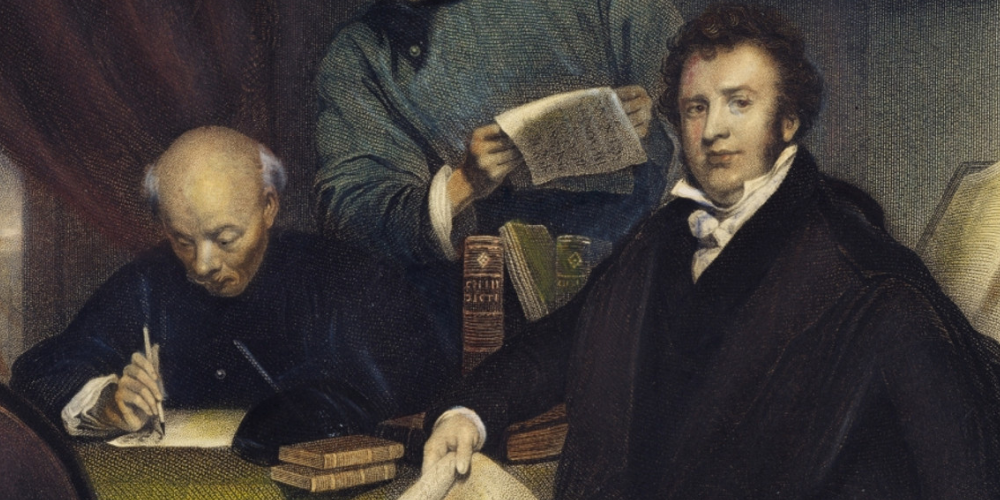
The Morrison Center
cultivating wisdom near and far
The Morrison Center is named after Robert Morrison, Presbyterian minister, translator, and the London Missionary Society’s first missionary to China. He is considered the father of Protestant mission work in China.
Robert Morrison (1782-1834)
The Morrison Center has been formed to assist the Chinese-speaking church in becoming better engaged and more deeply united with the catholic body of the Lord Jesus Christ through creating a platform and network that bridges Chinese-speaking theologians, theological professors, pastoral ministers, theological students, local churches, and others in the Chinese Christian community with the English-speaking theological world. By providing regular Chinese-language tutorials based upon Greystone content, the Morrison Center aims to bring the Greystone mode of learning to Chinese speakers, seeking to blend the richness of a pre-modern approach to theological formation with the discerning use of the most effective contemporary tools.
“Personally, I have studied at Greystone Theological Institute and dipped into the rich heritage of Reformed catholicity upheld by this institution. As a Chinese individual, I take great joy to see the promotion of this classical and catholic Reformed tradition within the Chinese-speaking theological world, thanks to the dedicated efforts of the Morrison Center. Guided by a Chinese-speaking mentor, students with limited English proficiency will now have the opportunity to immerse themselves in the abundant English theological resources offered by Greystone, enhancing their learning experience. I highly recommend it.”
Jason Zhao (Ph.D., Puritan Reformed Theological Seminary)
Academic Dean at Nazir College
5 Strategic Aims of Greystone’s Morrison Center
Support Chinese-speaking Theological Students. To assist Chinese-speaking students with little or no theological background to grasp Reformed theology. They will receive instruction in Chinese while engaging with essential Reformed theological courses in English, allowing students to delve immediately into Reformed theology at the outset of their learning. The Morrison Center provides a Chinese-speaking mentor to guide students through the learning process in and beyond course lectures.
Foster Academic Connections. To provide a platform for professors and lecturers in Chinese-speaking theological institutions to connect with Greystone’s resources and Learning Communities to maintain their continual, lifetime learning and their connection with the international theological community. In addition to utilizing Greystone resources, the Morison Center will host an annual roundtable discussion to delve into matters of contemporary theological importance. Occasional Mandarin editions of the Greystone Conversations podcast will also be created and distributed.
Offer Certificate and Degree Programs for Chinese-speaking Christians. Greystone's English resources are now fully accessible to Chinese-speaking Christians who have the option to complete courses entirely in English, assisted by either an English-speaking or Chinese-speaking mentor. Alternatively, they can listen to lectures in English while engaging in discussions and completing assignments in Chinese with the support of a mentor. Additionally, we are progressively localizing Greystone's lectures by incorporating Mandarin subtitles. This advancement enables native Chinese speakers to pursue certificates and degrees entirely in Chinese, under the guidance of Greystone-trained mentors.
Provide Continuing Education. To support Chinese-speaking graduates to further their theological studies and renew their understanding of God continuously in fellowship with the global Church. Greystone graduates, especially those engaged in pastoral roles, will have the opportunity to enhance their theological understanding by actively engaging with the Greystone Learning Communities, Greystone Connect, and other Greystone resources, all offered in both English and Mandarin.
Support Local Churches. Greystone is committed to aiding local churches in establishing Greystone Fellowship Communities (GFC) to facilitate (1) congregational formation, (2) lay and clergy edification, and (3) training or support for key topics of current interest in various formats. The Morrison Center aims to assist local church leaders in organizing study groups utilizing Greystone resources, available in both English and Mandarin, as well as send Greystone personnel to the GFC to lead workshops, study days, study weekends, special lecture events, or micro courses conducted in Mandarin and/or English.

Mr. Peter Chu
Coordinator, Greystone Morrison Center
“In the Chinese-speaking world, the ability to understand and even engage with the English academic community serves as a vital step for Chinese theological studies to ’reach deeper waters.’ As a network of contemporary leading theologians, Greystone has developed a unique approach to theological education, ecclesiastical discipleship, and academic discourse. If this approach can be extended to the Chinese-speaking community, it will be a tremendous blessing, enriching their understanding of God and fostering greater unity with the broader body of Christ. The Morrison Center's ministry will play a vital role in achieving this mission.”



